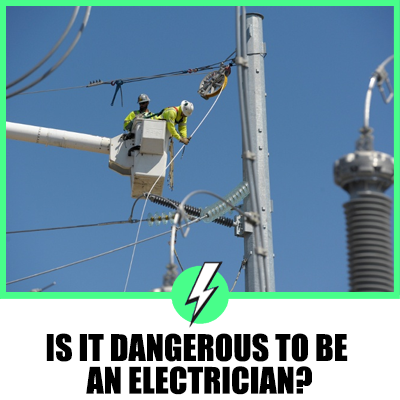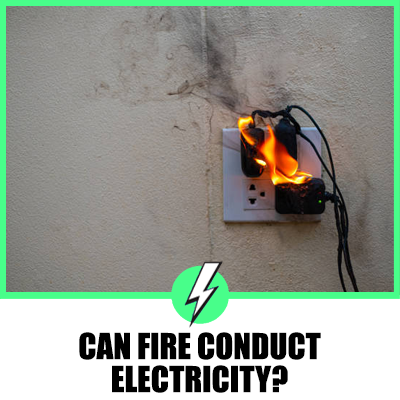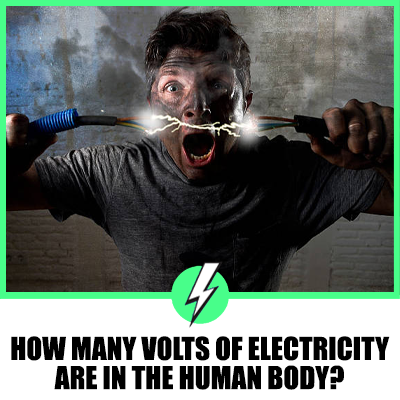Is It Dangerous To Be An Electrician?
Is being an electrician considered a dangerous job? We look at statistics that may surprise you. Plus, we answer:
- Do electricians get paid danger money?
- Can an electrician get life insurance?
- How many electricians die each year?
If you are not trained, working with electricity can be dangerous. Around 28 electricians die from electrocution at work every year, so it is a dangerous job. Although electricians are well trained, they do not receive danger money. Yes, electricians can purchase life insurance at the same rate as other people.

Contents
What is the most dangerous part of being an electrician?
Despite popular belief, more electricians are hurt from falls than from electricity. Electricians frequently work at height on ladders and step ladders, and this is the main cause of injury.
Incredibly the electricians become ill through the work environment! Electricians can often be found crawling on their hands and knees in loft spaces where they are exposed to bird and rat poop.
The droppings from rodents and birds are dangerous if inhaled or somehow ingested.
What are the hazards of the jobs as an electrician?
The main hazard other than falling from a ladder is being electrocuted and killed, this is rare, but electricians get shocked when working on mains power.
Electricity can do more than stop your heart; it can cause major burns as the electricity runs through your skin. The burns are often deep and can require skin grafts.
Electrical arcs will upset your day as an electrician and can easily set your clothing on fire, giving you a big shock.
Do electricians get shocked a lot?
Electricians are well trained and not known for their cavalier approach to work, so although electricians are exposed to the potential of electric shock daily, they rarely get a shock that causes injury.
Of course, when you work with electricity as an installer, the hazard is always present. Still, it should not be considered an occupational hazard to go home every day after receiving multiple jolts of electricity.
What are the 4 main types of electrical injuries?
- Electrocution can be fatal.
- Electric shocks are non-fatal.
- Burns from eclectic arcs.
- Falls from electric shocks from ladders.
However, the savvy electrician is well trained and mitigates as best as possible receiving electric shocks.
What are the signs of electrocution?
- Loss of consciousness.
- Muscle spasms.
- Numbness and tingling in the limbs.
- Difficulty breathing.
- Vision and hearing disturbances.
- Headache.
- Seizures.
- Burns to the skin and smouldering clothing.
Call an ambulance and the onsite first aid person if any of the above signs are present after an electric shock.
Can electricity knock you out?
Yes, if someone has received enough of an electric shock to render them unconscious, the shock could have stopped the heart, and you should be prepared to start CPR immediately after calling for help and an ambulance.
How much current can stop the heart?
1 to 4 amps are sufficient to stop your heart which is a sobering thought when you realise most of your basic appliances like bedside lamps have a 3 amp fuse!
What kills a person’s voltage or current?
It’s an interesting question, and here is the answer that will surprise you. 100 volts is no more dangerous than 1000 volts!
However, changing the amperage marginally can be the difference between life and death. Don’t get confused and you need the volts to carry the amps, so the higher the voltage, the higher the amps.
What are the chances of dying as an electrician?
It’s pretty slim if you consider the number of electricians working and retiring each year. The official figure is hard to find, but in 2017, it was recorded that 8.4 deaths per 100,000 were the fatality rate for electricians.
Do you think that is high? Compare it with farmworkers at 24 per 100,000, and it soon becomes apparent that being an electrician is a safe job, assuming you are trained and qualified to do the job!
How do electricians stay safe?
Electricians are trained in health and safety, their safety and anyone working around them.
There is no substitute for knowledge and experience when working with electricity, so understand the electrician working in your home has taken 4 years to qualify and then has worked a further 2 years to be recognised as a competent person to become accredited.
Of course, you can wear insulated gloves and insulated safety shoes to help protect you from shocks as part of your PPE, but nothing substitutes for knowledge and experience.





